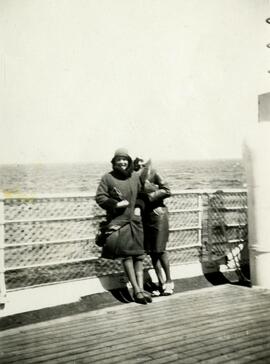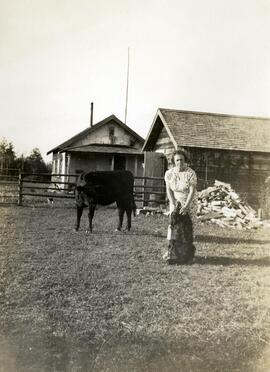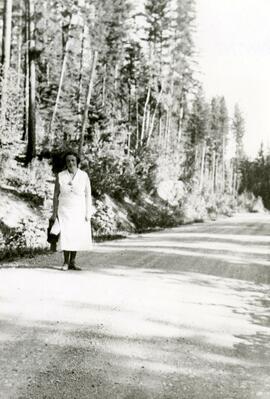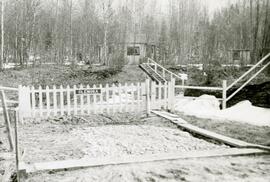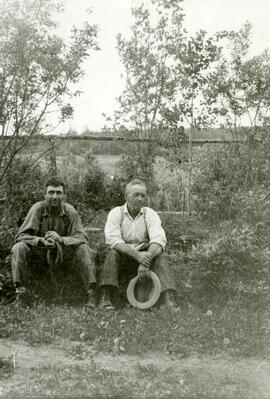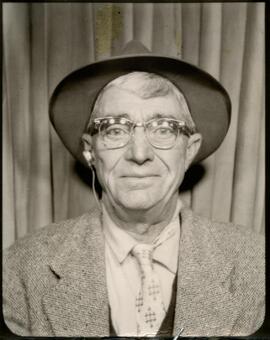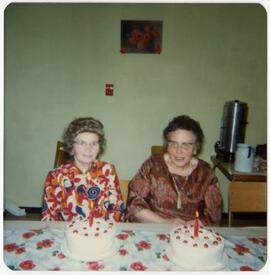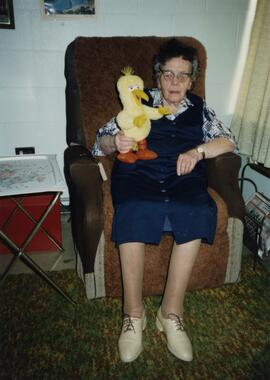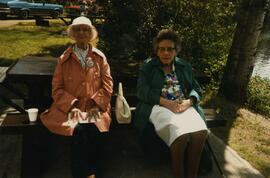Title and statement of responsibility area
Title proper
General material designation
Graphic material
Textual record
Parallel title
Other title information
Title statements of responsibility
Title notes
- Source of title proper: Title based on creator of fonds.
Level of description
Reference code
Edition area
Edition statement
Edition statement of responsibility
Class of material specific details area
Statement of scale (cartographic)
Statement of projection (cartographic)
Statement of coordinates (cartographic)
Statement of scale (architectural)
Issuing jurisdiction and denomination (philatelic)
Dates of creation area
Date(s)
-
1930-2002 (Creation)
- Creator
- Doherty, Norah Lilian Banbery
Physical description area
Physical description
- 5 cm of textual records
- 9 photographs
Publisher's series area
Title proper of publisher's series
Parallel titles of publisher's series
Other title information of publisher's series
Statement of responsibility relating to publisher's series
Numbering within publisher's series
Note on publisher's series
Archival description area
Name of creator
Biographical history
Norah Banbery was born on May 6, 1901 to Emma Marshall and Paul Banbery in Wolverhampton, England. In 1930 Norah Banbery left Wolverhampton, setting sail from Liverpool to Canada to follow what had become for her "a perennial obsession" since childhood - the desire to explore the Canadian West. Lured by the attractive posters from the Canadian Pacific Railway that displayed "long vistas of golden wheat…(and) range lands ... alive with grazing cattle…" Norah, along with hundreds of other Europeans, set sail to find work and a new life in a new land. Not long after she arrived in Canada she met and married an Irish immigrant farmer on the prairies, Alexander James Irwin Doherty ("Irwin" or "Jim").
In the 1930s and 1940s Norah wrote articles about farm life in Canada for the Wolverhampton Express and Star newspaper, and later began her memoir about life in the Red Rock region. Her memoir "A Man's Country" recalls her early years in Meota near North Battleford, Saskatchewan where she met her husband [alias Jim Martin in the manuscript]. It follows the Doherty's move to British Columbia to homestead on 160 acres of land in Red Rock, south of Prince George along the Fort George Canyon on the Fraser River. Norah's account of life in Red Rock recalls experiences similar to that of other farmwomen in isolated Western Canadian communities in the Depression era. These were often days spent cleaning, cooking, and most significantly rationing, penny-pinching and finding ingenious ways to create a comfortable household in a log cabin. Yet Norah's account also provides a personal view of life as a young woman in a new land. She talks about her longing for female companionship and also her attraction to the land and the people that she met. Her story provides a woman's perspective of "living off the land" in a time when many still considered the area to be, as Norah states, "A Man's Country".
Norah Doherty died at the Jubilee Lodge, a senior's home in Prince George in 1991, at the age of 90 years. Her husband, Alexander James Irwin Doherty, died many years earlier on March 25, 1960.
Custodial history
Northern BC Archives & Special Collections received a photocopied version of Doherty's manuscript in 2000 from Susan Park. A donation of the original manuscript from the estate followed in 2001, along with family photographs and accompanying photocopies of related records.
Scope and content
Fonds consists of an unpublished manuscript entitled "A Man's Country" written by Norah Banbery Doherty, accompanied by photographs and related photocopied articles and correspondence written or received by Doherty.
Notes area
Physical condition
Immediate source of acquisition
Arrangement
Language of material
English
Script of material
Location of originals
Availability of other formats
Restrictions on access
No restrictions.
Terms governing use, reproduction, and publication
Personal or academic use of materials is welcomed under the standard fair dealing and educational use clauses of Canadian Copyright Law. Commercial use is, however, forbidden without the express permission of the copyright holder. For information on obtaining written permission from the copyright holder, please contact the Northern B.C. Archives and Special Collections.

